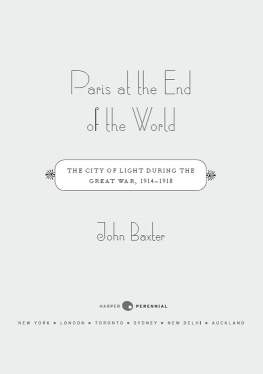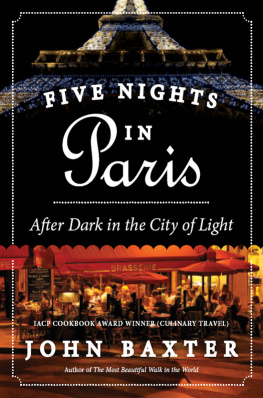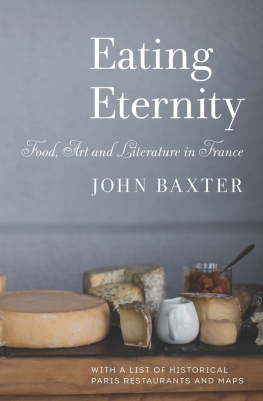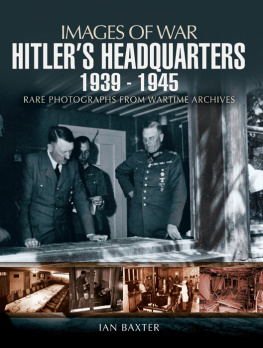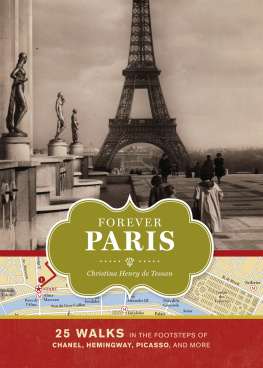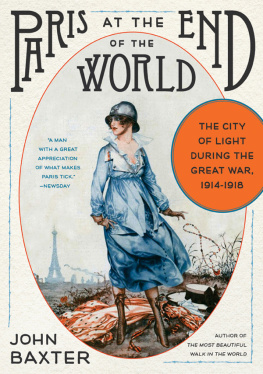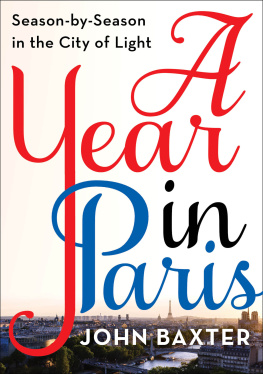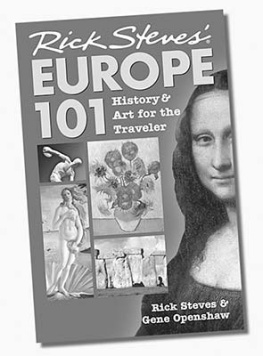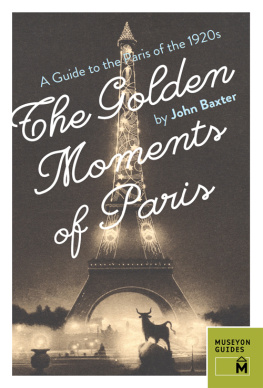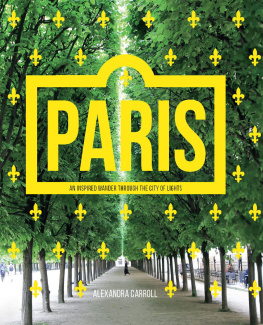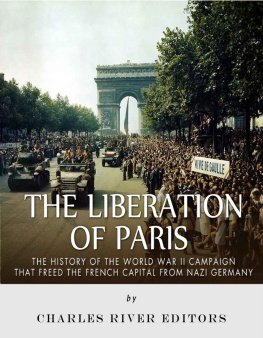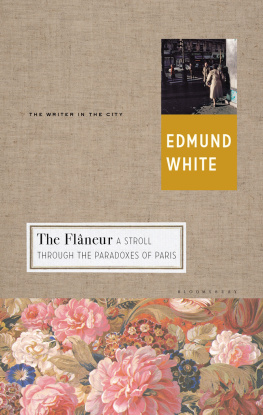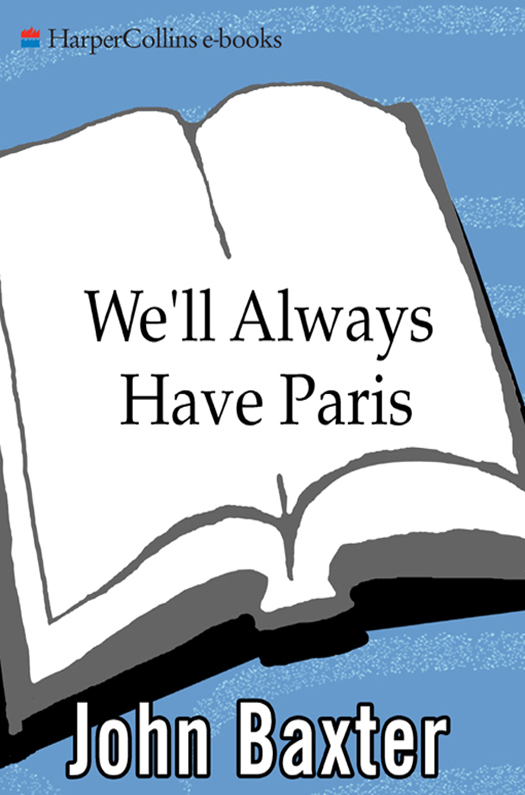ILSA : What about us?
RICK ( tenderly ): Well always have Paris. We didnt have. Wed...wed lost it until you came to Casablanca. ( Softly ) We got it back last night.
Humphrey Bogart and Ingrid Bergman in Casablanca ; screenplay by Julius J. and Philip G. Epstein, and Howard Koch, from a play by Murray Burnett and Joan Alison
JUST AFTER I MOVED TO PARIS IN 1990, THE WOMAN who inspired this migration, my wife-to-be Marie-Dominique, took me to a dinner party at the suburban Paris home of Leo, a journalist friend.
Though, looking back, I see that evening as a turning point, it seemed at the time just another rite of passage in the painful experience of being absorbed in more depressed moments I thought devouredby France.
After a mammoth dinner, and over cognac, coffee and, for the other guests, enough tobacco to asphyxiate an emu, I confided to Leo, a man of about my age, my trepidation at adjusting to a French family.
John, he said, believe me, I know the difficulties. I too married a foreigner. He drew on a broomstick-sized Havana. She was my first wife. An English girl. Very nice, you know. Well brought up. An English rose. A rose with thorns, as I later discovered, but at the time... He shrugged.
So...I am invited to London to meet the parents. It is nineteen sixty-two, perhaps sixty-three. I am...what? Twenty-five. Not a boy, but...well, a little nervous just the same.
And it gets worse when I see the family home! A mansion, mon vieux ! In a quartier trs chic . And the parents the same. Haute bourgeoisie . Not quite the monocle and the military moustache, but you can imagine.
And here I am, this French upstart, who desires to kidnap their delicate flower. They are not happy.
So far, I could sympathize. A few weeks before, sitting down to Christmas dinner with the fourteen members of my new French family, Id felt the same suspicion radiating from them.
Well, dinner, it is all right, Leo continued. I do not disgrace myself: drink the finger bowl or blow on my soup.
After the dessert, maman and Patricia do what women do, while papa and I drink port and smoke a cigar. He held up his Romeo y Julieta. Not so good as this, but I am diplomatic.
And then...time for the bed. Of course, Patricia and I, we are already sleeping together in Paris, but chez papa et maman this cannot be. She has her old room, next to her parents, while I am as far away as they can managein the attic almost.
So we go to bed. And I sleep. But almost immediately I wake up. It is deep night. I cant see my watch, but I think it is two, perhaps three in the morning. And I feel terrible. Trapped. Like an animal. I cannot breathe in this place. I must get out. I find my clothes and my car keys, and open the front door. Leo mimed taking a deep breath. And already I feel better. The fresh air, the stars, the trees; London is quite beautiful in some ways, dont you think?
Yes. But its not Paris.
Ah, well, no. Nothing is as beautiful as Paris. But it is pleasant anyway, so I decide to take a drive. Into the...is it the West End? The centre of London anyway.
I am alone on the road. Almost no cars. Nobody walking. And its worse in the city. No cafs, no bars. Everything closed and dark.
I have almost despaired when I see one lighted doorway. A sign says Saddle Club, and there are steps leading down to a...how do you say... une cave ?
A cellar?
Yes. A cellar. So I park, and I go down the steps. He smiled at the memory. It is a little jazz club, a bote de nuit . The sort I know well from Paris. Like Le Petit Opportun or Le Chat qui pche. The chairs are up on the tables and the bar is closed, but on the stage are playing some musiciansa guitarist and a contrebassiste .
And I can scarcely believe my eyes! Because the guitarist, it is Brassens!
For anybody born in France after World War II, Georges Brassens, poet and songwriter, is close to a saint. He died in 1981, but his fame and popularity continue regardless. His warm voice and friendly face with its bushy moustache are icons. His songs have become anthems, known by heart everywhere.
Incredible, I said. I never knew he played London.
I too hardly believe my eyes, says Leo. But yes, it is the voice. And he sings his own songone of my favourites, Ballade des dames du temps jadis . You know it, from the poem of Franois Villon? Where are the girls of yesteryear? To see Brassens there, in this city so hostile to a young man...this is the answer to a prayer.
Did you speak to him?
Ah, well, I come to that.
He carefully ashed his cigar. I wondered if I dared. The club is closed. He plays simply for his own pleasure. But as I hesitate, he puts down his guitar, steps from the stage, and walks towards the... double-vay-cay...le...
The mens room, I supplied.
Cest exact . And I think: Well, in les toilettes , we are all equal, nest-ce pas ? Just men. And men may chat.
So I follow. And there he is. The great Brassens making pipi . And so I take the place next to him...And I turn to face him...And I open my mouth to say, Bonsoir, Monsieur Brassens...
Leo drew heavily on his cigar, savouring the memory.
And it is at this moment that I wake up, and find I am urinating in the bed of my future father-in-law. He expelled the smoke. So you see, it is not so bad, my friend. You have not pissed in the bed.
Even as I agreed, I couldnt help thinking, Its early days yet .
No amount of fire and freshness can challenge what a man can store up in his ghostly heart.
F. Scott Fitzgerald, The Great Gatsby
FOR ME, THE 1920S AND 1930s RADIATE A GLAMOUR they can only possess for someone who didnt live through them.
Shorn of grim features such as the Great Depression, the 1919 influenza epidemic, the Russian revolution and the Holocaust, Europe between the two world wars appears to blaze. Or at least it did to someone growing up in an Australian country town in the 1960s. But like the Hawaiian tsunamis that petered out on Bondi Beach as modest swells, the upheavals that revolutionized art and culture on the other side of the world were ripples by the time they reached us.
I could see the ghost of a new philosphy of design in the streamlining of our Bakelite mantel radio, and recognize Surrealism in the two-dimensional landscape and amputated torsos of a poster for brassires by Hestia (popularly thought to be an acronym for Holds Every Size Tit In Australia), but both looked ill at ease in a country that still based its architecture and its ideas on the English home counties, and where the cutting edge of automobile design was represented by the boxy, underpowered Triumph Mayflower.
Australia, I quickly decided, held nothing for me. Notwithstanding our national song, Advance, Australia Fair, the country seemed to be not advancing at all but devolving, the people patiently retracing their steps down the evolutionary line, heading back to the Triassic and a way of life you could depend on. In my jaded view, Australians swam like fish and thought like sheep. I wanted out.

